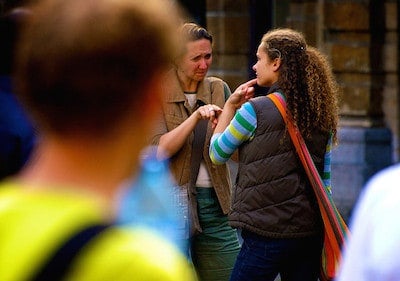Naomi Peschke is an animated social work senior with a streak of purple hair and a love for what she calls the Deaf community –with a capital D. She is also the recipient of a fellowship from the UT Austin Office of the Vice President for Research, which this past spring semester she used to collect information about the availability and accessibility of mental heath services for Deaf Texans.

“How we write ‘deaf’ is important,” says Peschke, who is a Texas-certified, professional sign language interpreter.
“Deaf with a lowercase ‘d’ refers to a person’s audiological status,” she explains. “But when we use a capital ‘D’ we are indicating that the person is also part of the Deaf community and has grown up in that culture. I use ‘Deaf’ instead of ‘deaf’ because I’m talking about the community, the culture, and not just about the hearing loss.”
While interpreting for Deaf clients in medical settings, Peschke frequently heard that there were not enough mental health clinicians in Austin who were fluent in American Sign Language (ASL) and, more generally, that there was a high need for appropriate mental health services for Deaf individuals.
In order to improve mental health care for Deaf people and making services truly accessible, Peschke says, three things should happen:
- There should be more Deaf clinicians working in the field
- Hearing clinicians need more training about Deaf culture and American Sign Language
- Many professional interpreters would benefit from specialized training in the domain of mental health.
During her senior year at the School of Social Work, Peschke decided to research these issues in the local context of Austin.
With the mentorship of social work professor Angela Nonaka, Peschke put together a proposal for the Office of the Vice President for Research to study mental health services available to Deaf Texans. The project was selected for funding, and Peschke spent the spring semester collecting data. She conducted in-depth interviews with therapists who serve Deaf clients in Austin to understand the type of training they had, the services they offered, and the barriers they faced in serving this population.

“It has been a whirlwind. Very educational,” Peschke reflects. “We learn in our research methods class about our hypothesis and all that, but doing the actual research seems like a different ball game. You have to do the training about human subjects research and go through IRB [Internal Review Board] to get approval… I can’t tell you how many drafts I did! I also learned how to write a proposal, how to develop a research questionnaire. I had to hone my interview skills… all of it!”
“These Undergraduate Research Fellowships are intended to give undergraduates direct, hands-on experience conducting research and confronting the challenges associated with each stage of the process,” Nonaka says. “Naomi did what was needed to successfully complete her project, and in doing so she helped me learn and grow as a teacher and scholar. For the last year we’ve been on a journey together, and it’s been fun!”
Peschke and Nonaka are currently diving deep into the data and developing an article for publication.
“Naomi’s research confirmed that, even in the 21st century, there is a shortage of fully accessible, linguistically and culturally appropriate mental health services for native ASL-signing, culturally Deaf people in the United States,” Nonaka says.
More importantly, Nonaka adds, Peschke’s qualitative research gives useful insights into the specific challenges that local mental health practitioners in Austin face in their daily work serving Deaf clients.
“This information will allow us to think about how to better address these issues through social work education, practice, and/or policy advocacy,” Nonaka indicates.
For instance, through her interviews with clinicians who serve Deaf clients, Peschke found out that most of them had not received training on the specific needs of the Deaf community, and that all of them were concerned about miscommunicating when depending on an interpreter. She also found that insurance companies usually do not reimburse interpreting fees, so clinicians may lose money if they agree to see a Deaf client.
“All these factors impede Deaf consumers’ equal access to mental health services,” Peschke says.
When asked what was the best part of doing research, Peschke smiles and shows that at heart, she is a social worker passionate about advocacy and social justice.
“I thoroughly enjoyed networking with clinicians, hearing their perspectives, and talking with them,” she says. “But the best part was after the questionnaire was done, the camera was turned off, and I was able to advocate for the Deaf community.”
Posted October 23, 2015. Main image: “Communication. Sign Language,” by Flckr user Luis Miguel Justino via Creative Commons.

